|
|
|
Sort Order |
|
|
|
Items / Page
|
|
|
|
|
|
|
| Srl | Item |
| 1 |
ID:
131024


|
|
|
|
|
| Publication |
2014.
|
| Summary/Abstract |
In a March 2014 report, the United Nations human rights investigators con?rmed that chemical weapons were indeed used in Syria in 2013, which apparently came from the stockpiles of the Syrian military, whose chemical weapons stash reportedly included mustard gas. The report con?rmed that the deadly nerve agent Sarin was used in three separate incidents: the Damascus suburb ofal-Ghouta in August 2013, Khan al-Assal in March 2013 and Saraqeb near the northern town of ldlih in April 2013. While the Bashar al-Assad government and the Syrian opposition indict each other of using chemical weapons, which are strictly banned as per existing international law and convention, the incidents amount to being the deadliest chemical attacks the world has witnessed in almost a quarter of a century.
|
|
|
|
|
|
|
|
|
|
|
|
|
|
|
|
| 2 |
ID:
132787
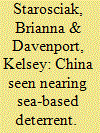

|
|
|
|
|
| Publication |
2014.
|
| Summary/Abstract |
China will soon have its first credible sea-based nuclear deterrent, according to a U.S. Defense Department report released last month.
The report said Beijing is placing a "high priority" on updating and developing its submarine force and will soon deploy the Julang-2 (JL-2) submarine-launched ballistic missile (SLBM) on its Jin-class submarine.
The Defense Department is required by law to submit an annual report to Congress on China's military capabilities and force modernization.
|
|
|
|
|
|
|
|
|
|
|
|
|
|
|
|
| 3 |
ID:
131846
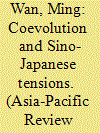

|
|
|
|
|
| Publication |
2014.
|
| Summary/Abstract |
Unlike those who blame the other side or structural forces beyond one's control for the current Sino-Japanese tensions, this paper offers a theoretical insight about the coevolution between China and Japan to explain why the two Asian great powers that had a better relationship in the past are now experiencing greater tensions when their much closer economic and people-to-people ties should facilitate greater cooperation. The two nations have coevolved over millennia with increasing intensity over time. They avoided serious tensions in the 1970s-1990s partly thanks to each being situated in a different niche. But that separation has diminished in a globalizing world and the two countries are becoming more integrated, which has triggered a backlash. The earlier generation of proponents of Sino-Japanese friendship succeeded in forging strong economic and social ties, but the current generation finds it difficult politically and psychologically to manage the new reality in their relations.
|
|
|
|
|
|
|
|
|
|
|
|
|
|
|
|
| 4 |
ID:
132584


|
|
|
|
|
| Publication |
2014.
|
| Summary/Abstract |
China has been surging ahead and pushing for infrastructural development in the western region of the country, which includes the restive areas of the Xinjiang Uighur Autonomous Region (XUAR) and the Tibetan Autonomous Region (TAR). This push is essential if it sincerely wants the often ignored west of the country to be at par with the relatively more thriving east. Included in the government's plans, which began in the year 2000, is the setting up of small-scale industries and factories and also tapping into the vast mineral deposits in the area, and, in the process, generating employment for the locals. Furthermore, plans to improve connectivity within the area are also underway. This includes establishing rail and road networks linking the region, in particular the Tibetan plateau with the mainland. Massive projects are already underway, with some in the second or third phases. Prime among these projects is the ambitious Qinghai-
Tibet Railway (QTR) link.
|
|
|
|
|
|
|
|
|
|
|
|
|
|
|
|
| 5 |
ID:
128531
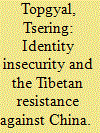

|
|
|
|
|
| Publication |
2013.
|
| Summary/Abstract |
This article re-examines the five-decade-old Tibetan struggle against Chinese rule, asking what drives this multifaceted resistance. It argues that identity insecurity has been at the heart of the Tibetan struggle, and takes a position against the problematic practice in both the academic literature and popular discourse of treating Chinese policies and practices as security-driven and the Tibetan struggle as motivated by ethno-nationalistic impulses. It charts the vigorous contestation within the Tibetan diaspora between those standing issue images_86_3_Topgyal_Tibet_03for complete independence and others who are satisfied with "greater autonomy" and examines the multifaceted resistance inside Tibet. It also recognizes the unifying effects of the widespread loyalty to the Dalai Lama and fears for the survival of the Tibetan identity. The article also examines the links between Tibet and its diaspora. All these themes are developed while demonstrating the security rationale behind the Tibetan struggle
|
|
|
|
|
|
|
|
|
|
|
|
|
|
|
|
| 6 |
ID:
131847
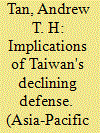

|
|
|
|
|
| Publication |
2014.
|
| Summary/Abstract |
Taiwan's declining defense capability has increasingly tilted the balance of power in the Taiwan Strait towards China. While the current status quo suits Taiwan's domestic political realities and postpones the Taiwan question to the future, its declining defense capabilities vis-à-vis China hold important implications for Taiwan. They include the reduction of its political bargaining power with China, the undermining of stability in the Taiwan Strait as China increasingly has a viable military option, and ultimately decreases the probability that the status quo can be maintained. Left unattended, Taiwan's declining defense capabilities narrow Taiwan's options and could lead to unpalatable outcomes, including sudden crisis and conflict, and the ultimate resolution of the Taiwan problem on China's terms.
|
|
|
|
|
|
|
|
|
|
|
|
|
|
|
|
| 7 |
ID:
130887
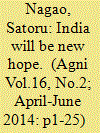

|
|
|
|
|
| Publication |
2014.
|
| Summary/Abstract |
A key ponderable that emerges while reviewing recent happenings is the fast progression of Japan-India relations. What are the reasons for this phenomenon?. The Japanese emperor's visit to India in November 2013 was the first ever such vision in history. January 2014 was the first time for a Japanese prime minister to grace the Indian Republic day parade as the chief guest.
|
|
|
|
|
|
|
|
|
|
|
|
|
|
|
|
| 8 |
ID:
130184
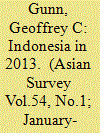

|
|
|
|
|
| Publication |
2014.
|
| Summary/Abstract |
Ahead of upcoming elections, expectations ran high in 2013 across the archipelago for a highly pluralistic electorate. With China as a leading trading partner, the backdrop for Indonesia was steady economic growth, albeit checked by a sliding currency, a current account deficit, and a depressing culture of corruption. Mixing commerce and geopolitics, China, the U.S., and Japan all turned to Indonesia to expand their influence.
|
|
|
|
|
|
|
|
|
|
|
|
|
|
|
|
| 9 |
ID:
132164
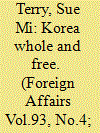

|
|
|
|
|
| Publication |
2014.
|
| Summary/Abstract |
When Kim Il Sung, North Korea's founding ruler, died in 1994, many outside observers predicted that his state would die with him. That never happened, of course, and his son Kim Jong Il managed to keep the regime alive until his own death, in 2011. When his son Kim Jong Un took the reins that year, numerous Korea watchers again predicted a collapse. Once again, they were proved wrong. Despite its extreme poverty, North Korea is still very much alive and a major threat to its southern neighbor.
|
|
|
|
|
|
|
|
|
|
|
|
|
|
|
|
| 10 |
ID:
131422
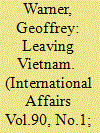

|
|
|
|
|
| Publication |
2014.
|
| Summary/Abstract |
Although anticipated, the North Vietnamese 'Easter offensive' against South Vietnam in 1972 created problems for the United States. Having reached a rapprochement with Communist China, President Nixon and his foreign policy adviser, Henry Kissinger, believed that the attack could have serious repercussions for their attempt to balance it with détente with the Soviet Union, not to mention the US's credibility as a Great Power. They also feared it would damage Nixon's prospects for re-election in November 1972. Despite opposition from his Defense Secretary, Nixon renewed the bombing of North Vietnam which had been stopped by President Johnson in 1968. This helped to bring the North Vietnamese back to the conference table and after complex negotiations, a draft peace agreement was ready for initialling in October 1972. However, President Thieu of South Vietnam saw significant drawbacks in the agreement and refused to go along with it. The North Vietnamese chose to have one more attempt to win on the battlefield and President Nixon, who had scaled down the bombing when peace seemed closer and won a landslide victory in the presidential election, launched another eleven days of concentrated bombing raids on North Vietnam at the turn of the year. This led to the final agreement initialled on 23 January 1973, which President Thieu reluctantly acceded to. Thieu's reservations were justified, but Nixon realized that, despite his electoral victory, he could not count on the continued support of Congress and the American people for the war. Far from bringing 'peace with honor in Vietnam and Southeast Asia', the January agreement was a fig leaf to cover American withdrawal.
|
|
|
|
|
|
|
|
|
|
|
|
|
|
|
|
| 11 |
ID:
131717
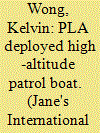

|
|
|
|
|
| Publication |
2014.
|
| Summary/Abstract |
A people's liberation army (PLA) border patrol unit based in the Nyingchi Military sub district has brought into operation a new patrol vessels specifically design for high altitude activities.
|
|
|
|
|
|
|
|
|
|
|
|
|
|
|
|
| 12 |
ID:
132080
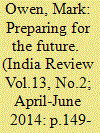

|
|
|
|
|
| Publication |
2014.
|
| Summary/Abstract |
In his 1997 analysis of the history of Tibetan and Chinese relations (The Snow Lion and the Dragon), Melvyn Goldstein advised in his concluding chapter that Tibetans were unlikely to indefinitely put up with the Chinese occupation of Tibet without resorting to violence. However, despite continuing speculation, more widespread or sustained campaigns of violence have largely failed to materialize. The principle objectives of this study are to establish why the scale of violence that Goldstein warned about has so far failed to emerge; and to assess whether existing evidence supports or undermines claims that violence may in the future emanate from Tibetan exile communities in India. It will be argued that previous analyses have been premised on a relatively narrow assessment of the situation and context, and that a more informed and nuanced evaluation of the potential for future violence requires comprehensive analysis of a much wider range of factors.
|
|
|
|
|
|
|
|
|
|
|
|
|
|
|
|
| 13 |
ID:
131469


|
|
|
|
|
| Publication |
2014.
|
| Summary/Abstract |
Military commanders, policymakers, and analysts have recently embraced the concept of combined action as a powerful tool to improve the effectiveness of Afghan security forces in the fight against the Taliban. In doing so, they explicitly draw inspiration from the Combined Action Program employed by US Marines during the Vietnam War. This program is widely considered to have greatly improved the effectiveness of South Vietnamese government forces and contributed to increased population security in its area of operations and is considered a model worthy of emulation. This study finds that the success of the Vietnam-era Combined Action Program was more qualified than contemporary proponents argue. It argues that successes were tempered, and conditioned, by the choice of junior commanders, the level of operational control enjoyed by the US Marines, and the way the local forces were recruited and deployed. These conditions offer valuable lessons for those seeking to employ combined action not only in present-day Afghanistan, but also in future counterinsurgency campaigns.
|
|
|
|
|
|
|
|
|
|
|
|
|
|
|
|
| 14 |
ID:
131385
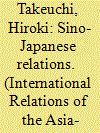

|
|
|
|
|
| Publication |
2014.
|
| Summary/Abstract |
China and Japan have been deepening economic interdependence over the last two decades, while China has recently shown territorial ambitions and initiated disputes with Japan. This runs contrary to the commercial liberal literature that argues that trade promotes peace. On the other hand, the realist theory also does not fully explain Sino-Japanese relations because Sino-Japanese relations are not always in conflict. The rise of China and the relative decline of Japan might explain increasing tensions in the rivalry relationship, but what drives Chinese leaders to initiate disputes? I address the importance of domestic politics to examine Sino-Japanese disputes. I argue that the recent deterioration of the bilateral relationship could be explained by the power struggle in the Chinese leadership. To support the logic of this argument, I use a game-theoretic model, which accounts for how the type of Chinese leadership influences foreign policy outcomes in Sino-Japanese relations.
|
|
|
|
|
|
|
|
|
|
|
|
|
|
|
|
| 15 |
ID:
132009
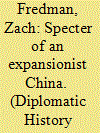

|
|
|
|
|
| Publication |
2014.
|
| Summary/Abstract |
The Chinese Revolution, Korean War, and McCarthyism loomed large over Kennedy administration assessments of Chinese intentions in Vietnam. The president and his advisors disagreed over the exact nature of the Chinese threat, but they uniformly believed in a dangerous, expansionist China. Their assessments promoted cautious escalation in Vietnam, where Kennedy sought to avoid "losing" another Asian country to Communism without provoking another war like Korea. This, in turn, promoted Chinese militancy. Central to Kennedy administration thinking was the idea that Vietnam served as a test case for Beijing's more radical foreign policy line vis-à-vis Moscow. This article traces the development and influence of such assessments. It also argues that the China factor informed Kennedy and Johnson administration notions of credibility. Holding back or reversing Communist gains in Asia by supporting Saigon offered these administrations the chance to kick once and for all the "who lost China" stigma that had haunted the Democratic Party since 1949.
|
|
|
|
|
|
|
|
|
|
|
|
|
|
|
|
| 16 |
ID:
131953
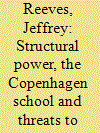

|
|
|
|
|
| Publication |
2014.
|
| Summary/Abstract |
This article engages with current debates surrounding China's security by employing the concept of structural power and the Copenhagen School approach to security studies to measure threats to China's security. Building on existing Chinese and English language research on China's security drivers, the article develops a mechanism for determining how China's economic relations with small states in Asia negatively affect their domestic stability and how this instability then loops back to undermine China's strategic position. The article uses China's relations with Cambodia, Nepal and Mongolia as case studies.
|
|
|
|
|
|
|
|
|
|
|
|
|
|
|
|
| 17 |
ID:
132079
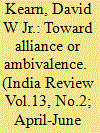

|
|
|
|
|
| Publication |
2014.
|
| Summary/Abstract |
Utilizing prevailing International Relations theory, this article seeks to explain the conditions under which India and the United States can be expected to achieve deep, long-term, strategic cooperation that could culminate in a formal alliance. Specifically, it considers the insights and predictions of realist and liberal theories while also considering critical domestic level factors that may shape India's capacity to be a reliable and attractive partner. While dramatic progress has been made since the initial thawing of the Cold War relationship, this article concludes that the future is likely to be a mixed bag, as the recent Obama experience has reflected. Only the emergence of an overtly revisionist China is likely to drive New Delhi and Washington toward a traditional alliance.
|
|
|
|
|
|
|
|
|
|
|
|
|
|
|
|
|
|
|
|
|